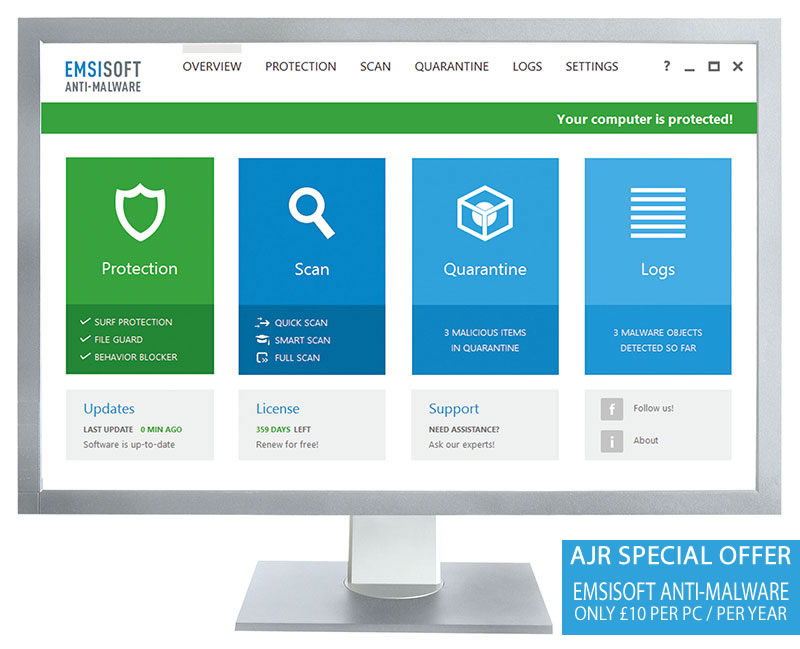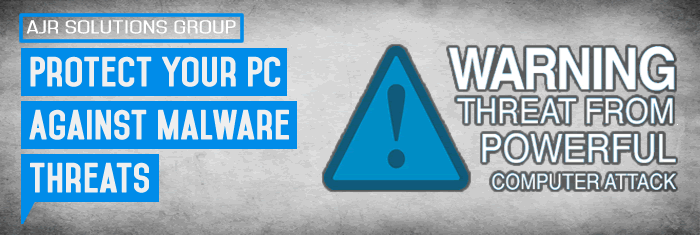In this article AJR will talk about how important it is to “Protect Your PC Against Malware Threats”
Online Cyber criminals and hackers are constantly devising new types of malware to commit financial theft, fraud, identity theft and other crimes against ordinary people. The proceeds of their crime are also used to fund further organised crime. This latest threat is particularly insidious as it uses two different types of malware form to infect your computer in order to commit these crimes:
- A virus known as Gameover Zeus, GOZeus, or P2PZeus
This is a type of aggressive malware which infects your computer so that it can effectively be ‘taken over’ by these online criminals and hackers. It can be used for a number of different criminal activities such as viewing your files, monitoring your bank accounts, sending emails in your name and even using your webcam to physically spy on you.
We have had customers in the past who have been infected with these types of malware and noticed that their web cam was turning on and off as they entered the room to go back to the computer as if they were been watched. kind of creepy..and very unsettling when the customer is telling you as we are professionals we know the symptoms to the type of malware they have installed on there machines and the customer is reeling them of one by one.
- Ransomware known as CryptoLocker
CryptoLocker is a virus which criminals use to prevent you opening any files – effectively locking down your PC – before issuing you with a ransom demand. If you pay the ransom, there is no guarantee that it will be unlocked. Once your computer is locked, it is effectively rendered useless as you cannot access your email, files, photos, music or bookmarks.
We have dealt with the CryptoLocker a few times especially for our business clients as it seems business are more prone to get this one due to opening up emails that have macros attached that install the malware once opened and boom!…got ya! you are now under ransom.
How computers get infected
You probably receive many emails claiming to be from your bank or another bank, a government body or other official source, urging you to check your account, claim a refund or other action. Many of these are phishing emails containing links to bogus websites, or attachments which you are told to open, which actually contain malware hidden in what is known as a Trojan. In this case, the criminals have also stolen or hacked email lists and can make it appear as if these are spam emails coming from a friend’s email account.
In this particular attack, the act of opening the attachment in such an email automatically ‘tells’ the Trojan to download the Gameover Zeus and CryptoLocker from a server normally located abroad, of which there are thousands which exist purely for criminal purposes.
Be very careful when opening emails from address that you don’t know check and read the address twice as some addresses look official but are not eg- @paypa1.com should be @paypal.com when read fast in an email the number 1 may not be noticed as it will not seem obvious
Signs to look for in spoofing emails
Urgent action required. Scammers often include urgent “calls to action” to get you to react immediately. Be very wary of emails containing these phrases like “your account will be closed,” “your account has been compromised,” or “urgent action required.” The scammers is taking advantage of your concern to attempt to trick you into providing confidential information.
Generic greetings. Scammers often send thousands of phishing emails at one given time. They may have your email address, but they don’t have your name and this is the biggest identifier!. Be skeptical of an email sent with a generic greeting such as “Dear Customer” or “Dear Member”. If you have an account with this so called company sending you these emails they will address you with your name!
Link to a fake website. To trick you into disclosing your user name and password, scammers often include a link to a fake website that looks like (sometimes exactly like) the sign-in page of a legitimate website. Just because a site includes a company’s logo or looks like the real page or site does not mean it is the same! Logos and the appearance of legitimate websites are very easy to recreate and copy.
 Hope you found this information useful and informative, please feel free to share this on social media as always that’s much appreciated. And if you need help in any way dealing with Malware or would like to be protected against online threats please get in touch with us we are always happy to help. You can also take advantage of our Anti-malware product we recommend above, AJR is a registered EMSISOFT partner for a reason because it works 100% pure and simple its the best product out there to protect your computer from malware, AJR uses it and we never recommend products we don’t use our self’s.
Hope you found this information useful and informative, please feel free to share this on social media as always that’s much appreciated. And if you need help in any way dealing with Malware or would like to be protected against online threats please get in touch with us we are always happy to help. You can also take advantage of our Anti-malware product we recommend above, AJR is a registered EMSISOFT partner for a reason because it works 100% pure and simple its the best product out there to protect your computer from malware, AJR uses it and we never recommend products we don’t use our self’s.



